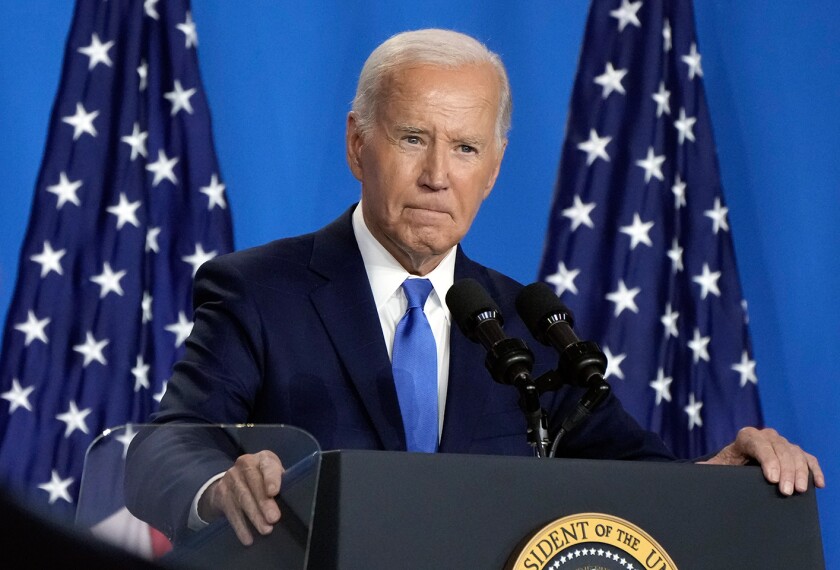President Joe Biden dropped out of the 2024 race for the White House on Sunday and right away endorsed Vice President Kamala Harris as his successor to the top of the Democratic ticket.
The announcement ends his bid for reelection following a disastrous debate with Donald Trump that raised doubts about his fitness for office just four months before the election.
The decision comes after escalating pressure from Biden’s Democratic allies to step aside following the June 27 debate, in which the 81-year-old president trailed off, often gave nonsensical answers, and failed to call out the former president’s many falsehoods.
Biden plans to serve out the remainder of his term in office, which ends at noon ET on Jan. 20, 2025.
“It has been the greatest honor of my life to serve as your President. And while it has been my intention to seek reelection, I believe it is in the best interest of my party and the country for me to stand down and to focus solely on fulfilling my duties as President for the remainder of my term,” Biden wrote in a letter posted to his X account.
Nearly 30 minutes later, Biden threw his support behind Vice President Kamala Harris, the party’s instant favorite for the nomination at its August convention in Chicago.
“Today I want to offer my full support and endorsement for Kamala to be the nominee of our party this year,” he said in another post on X. “Democrats—it’s time to come together and beat Trump.”
Vice President Harris says she’s honored to have Biden’s endorsement and that she intends to “earn and win this nomination.”
She released a statement calling Biden’s decision to end his campaign a “selfless and patriotic act.” She also thanked Biden for his “extraordinary leadership” and argued that his legacy as a one-term president would surpass the records of many chief executives who served two terms in office.
Biden’s decision came as he has been isolating at his Delaware beach house after being diagnosed with COVID-19 last week, huddling with a shrinking circle of close confidants and family members about his political future. Biden said he would address the nation later this week to provide “detail” about his decision.
The White House confirmed the authenticity of the letter.
The announcement is the latest jolt to a campaign for the White House that both political parties see as the most consequential election in generations, coming just days after the attempted assassination of Trump at a Pennsylvania rally.
A party’s presumptive presidential nominee has never stepped out of the race so close to the election. The closest parallel would be President Lyndon Johnson who, besieged by the Vietnam War, announced in March 1968 that he would not seek another term.
Now, Democrats have to urgently try to bring coherence to the nominating process in a matter of weeks and persuade voters in a stunningly short amount of time that their nominee can handle the job and beat Trump. And for his part, Trump must shift his focus to a new opponent after years of training his attention on Biden.
The decision marks a swift and stunning end to Biden’s 52 years in electoral politics, as donors, lawmakers, and even aides expressed to him their doubts that he could convince voters that he could plausibly handle the job for another four years.
Biden won the vast majority of delegates and every nominating contest but one, which would have made his nomination a formality. Now that he has dropped out, those delegates will be free to support another candidate.
Harris, 59, appeared to be the natural successor, in large part because she is the only candidate who can directly tap into the Biden campaign’s war chest, according to federal campaign finance rules.
Biden’s backing helps clear the way for Harris, but a smooth transition is by no means assured.
The Democratic National Convention is scheduled to be held Aug. 19-22 in Chicago, but the party had announced that it would hold a virtual roll call to formally nominate Biden before in-person proceedings begin.
It remained to be seen whether other candidates would challenge Harris for the nomination or how the party may need to adjust its rules again to smooth Harris’ nomination on the floor.
In 2020, Biden pitched himself as a transitional figure who wanted to be a bridge to a new generation of leaders. But once he secured the job he spent decades struggling to attain, he was reluctant to part with it.
K-12 in a 2nd Trump Term: Project 2025, a detailed policy agenda assembled by allies of the former president, outlines plans to dramatically scale back the federal role in education. Here’s how.
Kamala Harris’ Education Record: The vice president has touched education policy since her days as a prosecutor. What she’s said and done on K-12.
The GOP’s 2024 Education Platform: We break down the party’s nine key education positions in its official platform. Here’s what the party has in mind.
‘God Knows We Don’t Pay You Enough': Kamala Harris rallied teachers in one of her first campaign speeches. Here’s what she said.








